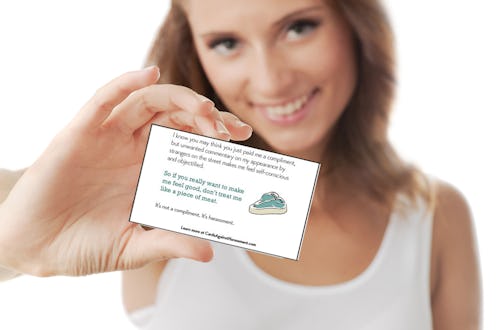Life
The Best Response to Street Harassment

Street harassment — lewd comments, whistling, honking, and undesired touching – is unfortunately a common experience for many women. If you're like me, you probably just try to shrug it off and pretend like you are too cool to be bothered by talking anal polyps like that (even if you are scared or annoyed). But with a project called Cards Against Street Harassment, one Minneapolis woman is showing the courage to talk back to her harassers. She distributes notes to her harassers and films her encounters, and it's illuminating.
Lindsey began Cards Against Harassment as a way to both record concrete experiences she has while in public, and to educate people about why street harassment is an issue. (Note: this is the same woman whose Missed Connections Craigslist post, detailing a guy yelling at her about her underwear, went viral.) She has recorded several encounters, in which she questions her harassers about why they find their comments desirable, normal, or even acceptable. Here are a few of her exchanges:
Harasser: You don't think women get dolled up and dressed up every day to look good?
Lindsey: You think...women want men to make comments to them?
Harasser: I'm surprised you're offended by that.
Lindsey: Why'd you call me a bitch?
Harasser: 'Cause you sexy.
To try to engage constructively with these men, Lindsey began designing cards with messages like "I know you may think you just paid me a compliment, but unwanted commentary on my appearance by strangers on the street makes me feel self-conscious and objectified. So if you really want to make me feel good, don't treat me like a piece of meat. It's not a compliment. It's harassment."
During her encounters, she tries to hand out these cards — and she encourages other women to print them out and do the same. Lindsey cautions that the cards are not right for all women, but those who are irritated to the point of exhaustion by street harassment (like me!) might want to give them a try: "Certainly if you do not feel safe confronting street harassment, you should not put yourself at risk. However, for many women, silence is frustrating and its own form of victimization," she writes on her website.
This kind of activism, which aims to delineate the problems behind street harassment in a non-violent and educational way, is exactly what we need. A 2014 study showed that 63 percent of American women experienced street harassment, as well as 25 percent of men. It is more than just a minor annoyance; it is a cultural epidemic. Hats off to Lindsey for helping us realize that. As she says on her FAQ page:
"At best, [street harassment is] annoying. At worst, it makes women feel unsafe because it forces them to wonder: if this man feels entitled to comment on my appearance, what's to stop him from trying to touch me, or follow me? So no, it's not a compliment. If a woman tells you it's not a compliment and you persist in doing it you are being intentionally intimidating."
Images: Fotolia; Cards Against Harassment (3); whovianrules/Tumblr